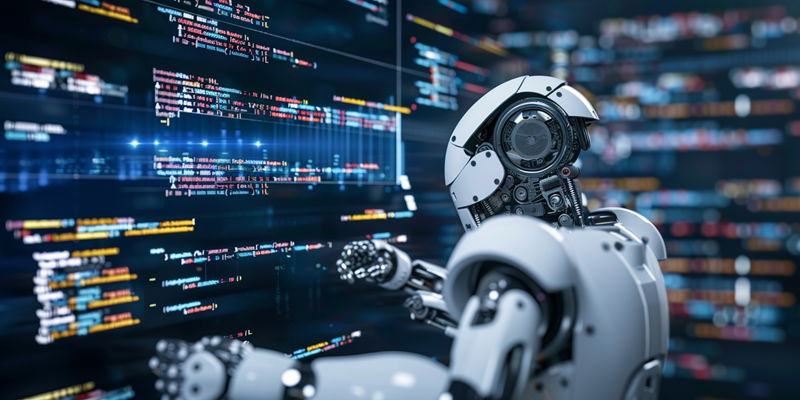The advent of Artificial Intelligence (AI) in the professional sphere has fueled a critical debate across myriad industries: whether AI is a threat to the workforce or a boon that elevates existing human capabilities. This question is particularly pertinent within the realm of DevOps, where the unique blend of development and operations hinges on both technological innovation and intricate human skill. As AI makes its foray into this arena, the discourse shifts to whether it is positioned to supplant or enhance the invaluable human engineer.
The Current State of AI in DevOps
Contrary to fears of obsolescence, the integration of AI in DevOps is not to displace human engineers but to complement and amplify their proficiency. Although AI systems are preeminent in executing routine tasks, they do not possess the complex problem-solving acumen and adaptability that human beings inherently offer. The critical nature of human oversight in the rollout of AI technologies is undeniable, as algorithms demand high-quality, well-curated data and human-crafted strategies to function optimally. A machine’s ability to navigate the unpredictable and dynamic requirements of an organization pales in comparison to that of a human, reinforcing the ongoing need for the latter’s involvement.
Furthermore, AI lacks the capability to fully understand and participate in the cultural elements essential to DevOps, such as collaboration and communication, which are fundamentally human. Despite AI’s growing sophistication, it is still grounded by the ‘garbage in, garbage out’ principle—signifying that the quality of AI outputs is only as good as the data it is fed. It is thus evident that the role of AI in DevOps is to assist rather than to usurp.
The Evolutionary Role of AI in DevOps Practices
AI in DevOps signifies progress, a transformative force that enhances rather than replaces. DevOps has inherently embraced automation, adopting it as a means to both accelerate software delivery and improve its quality. AI’s proposed benefit is in making this automation smarter—analyzing data to optimize DevOps processes and pipelines. With AI’s assistance in debugging, predictive analytics, and automated testing, the potential for efficiency gains is immense. Such advances in AI will not eliminate the need for DevOps engineers but will necessitate an adaptation of their roles and responsibilities, fostering a technological evolution that engineers must navigate adeptly.
Transitioning to a DevOps environment augmented with AI will occur over time. It will require DevOps engineers to expand their technical abilities to include AI oversight and integration. The promise of AI lies in its capacity to learn and optimize based on vast datasets, yet it refers back to human direction for foundational guidance and the final say in deployment strategies. As we steer through this transition, the roles of DevOps engineers will be redefined, becoming more intertwined with AI, as the two drive forward together in an intricate dance of innovation and human expertise.
Navigating the Human-AI Collaboration in DevOps
The integration of AI into DevOps does not signal an endgame where machines take over, but rather heralds the start of a synergistic partnership, reimagining the function of engineers. The automation of mundane tasks, such as documentation and system health monitoring, transfers routine workload from humans to AI. This shift affords DevOps engineers the latitude to plunge into intricate challenges and inventive problem-solving—a realm where human intuition and creativity are paramount.
The mutualistic relationship between AI and humans in DevOps creates a scenario where engineers are liberated from the robotic elements of their work, enabling them to hone in on the strategic, innovative aspects where human input is irreplaceable. As AI handles more of the system’s predictable operations, human engineers can channel their abilities into more impactful areas, fostering an environment ripe for the intangible human elements of insight and innovation.
The Future of AI-Infused CI/CD Pipelines
In the world of continuous integration and delivery (CI/CD), AI stands to offer unprecedented advancements by utilizing historical data to refine and enhance the deployment process. AI can accelerate the development pipeline, mitigating risks and identifying potential issues before they become obstacles. The notion of an AI-driven CI/CD framework showcases a future where the more procedural aspects of DevOps are substantially automated, presenting DevOps engineers with the challenge and opportunity to aim higher in their professional pursuits.
Framing AI as a formidable assistant rather than an opponent reshapes the landscape for DevOps engineers. It’s not about replacing humans but about enhancing their capacities and allowing them to concentrate on the visionary elements of their roles. By embracing AI as an empowering technology, engineers can look forward to engaging in more substantial, innovative work—work that is fueled by human imagination and complemented by machine-driven efficiency.
AI as a Force Multiplier in DevOps
The rise of Artificial Intelligence (AI) has sparked a significant discussion across various industries about its impact on jobs. This debate is especially relevant in the field of DevOps—a hybrid of development and operational disciplines that relies on both tech advances and human expertise. As AI advances into DevOps, a pivotal question arises: Will AI threaten or support the critical role of human engineers?
AI’s entry into DevOps isn’t just about potentially automating tasks, leading to efficiency, and reducing human error, suggesting it could replace some human functions. Instead, the argument is that AI can only enhance the DevOps field, providing tools that improve human work rather than replacing it. With AI’s help, engineers might tackle more complex, creative tasks, leaving routine work to algorithms.
Ultimately, the integration of AI into DevOps may strike a balance between technological empowerment and the irreplaceable nuance of human skill. The concern is not solely whether AI will take over human jobs, but how it can work with human intelligence to create a more robust and effective DevOps environment. This synergy could push the boundaries of what’s possible in the field, enabling a future where human insight and AI efficiency work in tandem for superior innovation and problem-solving.

